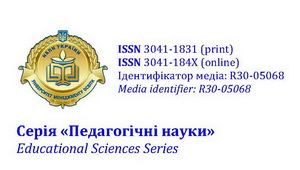Formation of ICT competency of future teachers
Анотація
Ключові слова
Повний текст:
PDF (English)Посилання
REFERENCES / СПИСОК ВИКОРИСТАНИХ ДЖЕРЕЛ
A. Cahangirov, Təhsilimiz: dünəndən sabaha. Optimistin baxışları. Bakı, Azərbaycan : Şərq-Qərb, 2020.
F. Əfəndiyeva, «Yeni təhsil proqramı və gələcək ibtidai sinif müəllimlərində peşə kompetensiyalarının formalaşdırılmasına verilən tələblər», Elmi əsərlər Azərbaycan Respublikasının Təhsil İnstitutu, № 5, s. 163–168, 2020. [Online]. Available: https://www.arti.edu.az/noduploads/book/arti-elmi-asarlar-2020-5.pdf Application date: October 10, 2024.
H. H. Əhmədov, Azərbaycan təhsilinin inkişaf strategiyası. Bakı, Azərbaycan : Elm, 2010.
V. H. Əliyev, Müəllim hazırlığı prosesində peşə keyfiyyətlərinin formalaşdırılması yolları. Bakı, Azərbaycan : ADPU, 2010.
T. Əliyeva, Müəllimlik peşəsi və müəllim-şagird münasibətləri. Bakı, Azərbaycan : ADPU, 2010.
F. İbrahimov, Ümumi pedaqogikadan mühazirələr. Bakı, Azərbaycan : Mütərcim, 2010.
M. İ. İlyasov, Müəllim peşəkarlığı və pedaqoji səriştəliliyin müasir problemləri. Bakı, Azərbaycan : Elm və təhsil, 2018.
N. M. Kazımov, Pedaqoji ustalığın problemləri. Bakı, Azərbaycan : Çaşıoğlu, 2009.
G. S. Məmmədova, «Müasir təhsil sistemində İKT-nin artan rolu», Elmi-metodik jurnalı, N 4, s. 64–70, 2023.
L. M. Qasımova, Pedaqogika. Bakı, Azərbaycan : Çaşıoğlu, 2003.
S. M. Quliyev, Müəllimlik ixtisasına giriş. Bakı, Azərbaycan : ADPU, 2015.
A. O. Mehrabov, Səriştəli müəllim hazırlığının problemləri. Bakı, Azərbaycan, 2015.
TRANSLATED AND TRANSLITERATED / ПЕРЕКЛАД, ТРАНСЛІТЕРАЦІЯ
A. Jahangirov, Təhsilimiz: dünəndən sabaha. Optimistin baxışları. Baku, Azerbaijan : East-West, 2020. (in Azerbaijani).
F. Efendiyeva, «New educational program and requirements for the formation of professional competencies of future primary school teachers», Scientific works Institute of Education of the Republic of Azerbaijan, № 5, pp. 163–168, 2020. [Online]. Available: https://www.arti.edu.az/noduploads/book/arti-elmi-asarlar-2020-5.pdf Application date: October 10, 2024. (in Azerbaijani).
H. H. Akhmedov, Education Development Strategy of Azerbaijan. Baku, Azerbaijan : Elm, 2010. (in Azerbaijani).
V. Kh. Aliyev, Ways of formation of professional qualities in the process of teacher training. Baku, Azerbaijan : ASPU, 2010. (in Azerbaijani).
T. Aliyeva, The Profession of a Teacher and the Relationship between a Teacher and a Student. Baku, Azerbaijan : ASPU, 2010. (in Azerbaijani).
F. Ibragimov, Lectures on General Pedagogics. Baku, Azerbaijan : Mutarjim, 2010. (in Azerbaijani).
M. I. Ilyasov, Modern problems of professionalism and pedagogical competence of the teacher. Baku, Azerbaijan : Science and education, 2018. (in Azerbaijani).
N. M. Kazimov, Problems of pedagogical skill. Baku, Azerbaijan : Chashioglu, 2009. (in Azerbaijani).
G. S. Mamedova, «The growing role of ICT in the modern education system», Scientific and methodological journal, N 4, pp. 64–70, 2023. (in Azerbaijani).
L. M. Gasimova, Pedagogy. Baku, Azerbaijan : Chashoglu, 2003. (in Azerbaijani).
S. M. Guliyev, ntroduction to the teaching profession. Baku, Azerbaijan : ASPU, 2015. (in Azerbaijani).
A. O. Mekhrabov, Problems of competent training of teachers. Bakı, Azərbaycan, 2015. (in Azerbaijani).
Посилання
- Поки немає зовнішніх посилань.
